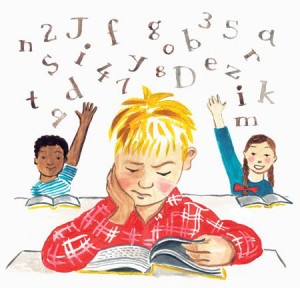 |
| image source: www.sosaschool.com |
Unless you’ve managed to live off-the-grid this season, you’re
probably aware of the hashtag #TrumpCantRead and the evidence various
commentators (including the ghostwriter of The Art of the Deal) have presented
to suggest that Donald Trump has difficulty reading and thus avoids doing so. I suspect these commentators are onto something, yet this hypothesis has actually made me feel a bit more sympathy for him.* While I feel strongly about calling out people
for destructive behavior, shaming someone for something they can’t control—that
crosses the line.
You see, lately I’ve been working on learning more about the psychology of shame.
After seeing Brené Brown’s TedTalk “Listening to Shame,” I bought one of her audio books that delves deeper into the subject. Shame is a powerful emotion that drives so
many destructive behaviors (chauvinism, perfectionism, bullying, etc.). Like the fight-flight-freeze response, humans
respond to shame by either puffing up, shrinking, or appeasing. Shame often
manifests in violent ways: from suicide to cruelty to others. As psychologist Mary C Lamia points out, “Narcissistic personalities often have the emotion of shame at their core.”
Let’s imagine for a moment that Trump really does have
trouble reading. Perhaps it is dyslexia; perhaps it has something to do with his attention span or countless other
issues that ideally would have been identified in childhood. According to a
Frontline documentary I saw, his father was a man who praised toughness and
mocked weakness. Perhaps little Trump was deeply ashamed by his struggles in
school and developed coping mechanisms to mask his struggles and deflect these feelings. Perhaps his
coping response was to puff up—to lash out at others. Jessi Sholl writes that “To
compensate [for our shame], we scramble to cover up our perceived flaws by
engaging in a long list of broken behaviors, including blaming and shaming
others, perfectionism, lying, and hiding out.”
Hmm… sound familiar?
Here’s the thing about shame: When someone’s toxic behaviors are in
response to their shame, trying to shame them into changing only makes them
more ashamed—and thus even less likely to change. (this especially applies when
trying to intervene with loved one who has an addiction problem)
Here’s the other thing: Shame is highly contagious. While the
intention of the #trumpcantread conversation may be to suggest that Trump isn’t well
educated on key issues, all the other people out there with reading
difficulties get the message loud and clear that their struggles are
shameful and their adaptations (getting news from t.v. instead of newspapers or
enjoying movies over novels or having someone type their Tweets for them, for
example) merit ridicule.
And that, is a real shame.
Taylor
P.S. I recently met a pastor who shared how, despite his severe dyslexia and previous beliefs that college wasn't for him and his only career options were manual labor jobs, he courageously went back to school and had just completed seminary. Bravo.
-->
*That is, in the same way I feel more sympathy for a school
bully after hearing about her horrid home life.

This was a very thoughtful post. I have noted that people seem to think that because they despise someone, it seems OK to them to then go and make labels about that person that extend to larger communities. This goes well beyond Trump. I've taken to simply pointing this out in various conversation with colleagues, friends, family. And I try to catch myself, as well. It's not easy though.
ReplyDelete